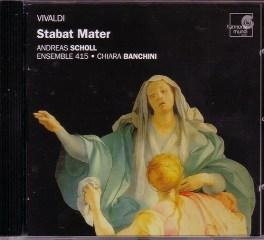Vivaldi - Stabat Mater (Scholl,Banchini) [1996]
Vivaldi - Stabat Mater (Scholl,Banchini) [1996]

1. Concerto Ripieno In C Major (RV 114): Allegro 2. Concerto Ripieno In C Major (RV 114): Adagio 3. Concerto Ripieno In C Major (RV 114): Ciaccona 4. Cantata 'Cessate, omai cessate' (RV 684): Largo e sciolto. Cessate, omai cessate 5. Cantata 'Cessate, omai cessate' (RV 684): Larghetto & Andante molto Ah ch'infelische sempre 6. Cantata 'Cessate, omai cessate' (RV 684): Andante. A voi dunque ricorro orridi specchi 7. Cantata 'Cessate, omai cessate' (RV 684): Allegro. Nell'orrido albergo ricetto di pene 8. Sonata 'Al Santo Sepolcro' (RV 130) -In E Flat: Largo molto 9. Sonata 'Al Santo Sepolcro' (RV 130) -In E Flat: Allegro ma poco andante 10. Introduzione al miserere 'Filiae maestrae Jerusalem' (RV 638): Recitativo. Adagio. Filiae maestrae Jerusalem 11. Introduzione al miserere 'Filiae maestrae Jerusalem' (RV 638): Largo. Sileant zephyri 12. Introduzione al miserere 'Filiae maestrae Jerusalem' (RV 638): Recitativo. Sed tenebris diffusis 13. Stabat Mater (RV 621): Stabat mater dolorosa. Largo 14. Stabat Mater (RV 621): Cujus animam gementem. Adagio 15. Stabat Mater (RV 621): O quam tristis. Andante 16. Stabat Mater (RV 621): Quis est homo. Largo 17. Stabat Mater (RV 621): Quis non posset. Adagio 18. Stabat Mater (RV 621): Pro peccatis suae gentis. Andante 19. Stabat Mater (RV 621): Eja mater, fons amoris. Largo 20. Stabat Mater (RV 621): Fac ut ardeat. Lento 21. Stabat Mater (RV 621): Amen. Allegro Andreas Scholl – countertenor Ensemble 415 Chiara Banchini – conductor
Vivaldi's early career as a composer was devoted mostly to instrumental works. Then, in 1712, when Vivaldi was in his mid-30s, he was commissioned to write the Stabat Mater included here for the church of Santa María della Pace in Brescia. Current scholarship indicates that it was his first sacred work. Then as now, the singer was a male, although we don't know whether he was a castrato or a countertenor. Perhaps unsurprisingly, this Stabat Mater doesn't feature the soloist at the expense of the instrumentalists, whose music is nevertheless kept to a modest scale. Modesty also figures in the work's thematic content, as the music of the first three sections is recycled in the second three. Virtuoso display and extreme emotion are absent in this work, which is attractive, balanced, and above all, devout. ---Ray Tuttle, classical.net
download (mp3 @320 kbs):
Last Updated (Sunday, 18 March 2018 10:02)








